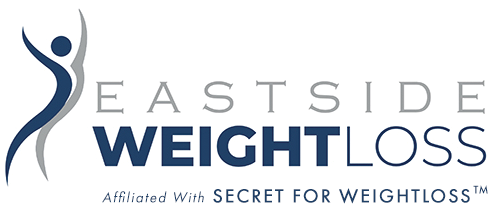Eastside Weight Loss
How Women Should Diet for Weight Loss

For women, losing weight often means balancing hormones, dealing with shifting metabolism, and creating routines that work in the real world. The best diet for women to lose weight isn’t a quick fix. It’s a set of habits that make you feel stronger, healthier, and more confident for the long haul.
Research shows that nearly 55% of women in the U.S. say they want to lose weight, but most diets fail because they focus on restriction instead of sustainability. If you’ve ever cut carbs or tried a crash diet only to rebound later, you know how frustrating that cycle can be. The real key is learning how to fuel your body in a way that supports your energy, your hormones, and your lifestyle.
In this guide, we break down what works best, including food choices, lifestyle strategies, and tips for women at different stages of life.
Approach Weight Loss With a Long-Term Perspective
Weight loss isn’t something that happens in a week or two. It requires consistency and patience. Diets for weight loss should be approached holistically, which includes developing long-term healthier habits.
True progress happens when you focus on sustainable weight loss for women, which means:
- Eating in a way that fits your daily life
- Creating habits you can maintain for years
- Supporting your metabolism instead of slowing it down
A simple food journal or tracking app can help you stay aware of your choices, while weekly weigh-ins give you feedback without the stress of obsessing over the scale. The more consistent you are, the better your long-term results will be.
Eat Smart for Weight Loss
One of the easiest ways to create a meal plan for women weight loss is by focusing on balance, not elimination.
Load up on plant-based foods like fresh fruits and vegetables. Swapping processed or fried snacks for an apple, orange, or celery sticks can save you up to 400 calories a day while still keeping you satisfied.
Switch from white bread, rice, and pasta to whole grains. They’re higher in fiber, which keeps you fuller for longer and reduces cravings.
Include lean protein like chicken, fish, beans, or tofu several times a week. Protein not only supports muscle but also helps regulate appetite. Over time, building muscle makes it easier to keep weight off.
Finally, check nutrition labels. Even foods marketed as “healthy” can be packed with calories, sugar, or sodium. Being aware of what’s in your food makes it much easier to stay on track.
Make Healthy Food Choices
Cut back on highly processed foods that are loaded with sodium. Too much salt not only raises your risk of hypertension but also makes your body hold onto water, leaving you feeling bloated.
Trade sugary snacks like candy bars for fresh fruit, which gives you natural sweetness along with fiber and vitamins. Choose grilled or baked dishes instead of fried meals: think grilled tacos, roasted chicken, or a hearty salad.
Whole grains like oatmeal, quinoa, and brown rice are another good swap. They digest slowly, keeping your energy steady during workouts or long days at work.
Limit red meat and include more fish or poultry in your meals. Both provide lean protein, and fish is a natural source of omega-3 fatty acids that support heart health and weight control.
Hormones, Stress, and Weight Loss
Hormones play a huge role in cravings, hunger, and fat storage, which is why hormone balance and weight loss are so closely connected.
Stress is one of the biggest disruptors. High cortisol levels push the body to hold onto fat, especially around the midsection. Finding ways to manage stress, whether it’s yoga, meditation, or even a daily walk, can lower cortisol and make weight loss easier.
Sleep is just as important. Studies show that getting fewer than seven hours a night interferes with appetite-regulating hormones like ghrelin and leptin. The result is stronger hunger signals and less satisfaction after eating, making it harder to stay on track.
Exercise ties it all together. Beyond burning calories, movement helps stabilize hormones linked to metabolism and mood. When diet, sleep, stress, and activity are in balance, weight loss becomes more achievable and sustainable.
Special Considerations for Women
Every woman’s weight loss journey looks different. Factors like age, hormones, and health conditions can shape what works best. Two of the most common challenges are weight loss for women with PCOS and weight loss for women over 50, and both require a slightly different approach.
Weight Loss for Women with PCOS
Polycystic ovary syndrome affects nearly one in ten women and often makes weight loss more difficult because of insulin resistance. A diet higher in protein, rich in fiber, and lower in refined carbs can help regulate blood sugar and reduce cravings. Consistent exercise supports hormone balance and makes progress easier to maintain.
Weight Loss for Women Over 50
For women over 50, metabolism naturally slows, and menopause can lead to added weight gain. Strength training is essential for maintaining muscle and keeping metabolism active. A protein-rich diet, along with calcium and vitamin D, supports both weight management and bone health. Eating smaller, balanced meals throughout the day can also keep energy steady and reduce overeating.
Reduce Stress Levels
Managing stress is an important part of any weight loss program for women. Stress hormones like cortisol can make it harder to lose those extra pounds.
Reducing chronic stress plays a real role in hormone balance and weight loss. You don’t need a perfect routine. But getting enough sleep, eating regular meals, staying active, and managing your daily workload helps your body feel safe enough to let go of weight. It also keeps you from burning out halfway through your plan.
If you’ve been trying to lose weight but keep hitting walls, it’s time for a smarter approach. At Eastside Weight Loss Clinic, our system is designed around the best diet for women to lose weight, customized for your body, your schedule, and your goals. Whether you’re working on weight loss for women with PCOS, tackling weight loss for women over 50, or just need a simple structure that actually fits your life, we will guide you through it.
Small Steps, Big Changes
The best diet for women to lose weight involves making smarter, consistent choices that support your health, hormones, and lifestyle. Whether you’re building a meal plan for women’s weight loss, addressing PCOS, or focusing on sustainable weight loss for women over 50, success comes from long-term commitment, not quick fixes.
Start by swapping processed foods for whole options, adding more protein and fiber, managing stress, and getting quality sleep. These small steps add up to big changes over time.
If you’re tired of guessing what works and want a proven path forward, Eastside Weight Loss Clinic is here to help. Our programs focus on sustainable weight loss for women, with personalized support for hormone health, PCOS, and age-related challenges.
Book your free consultation today and discover how you can finally reach your goals.
